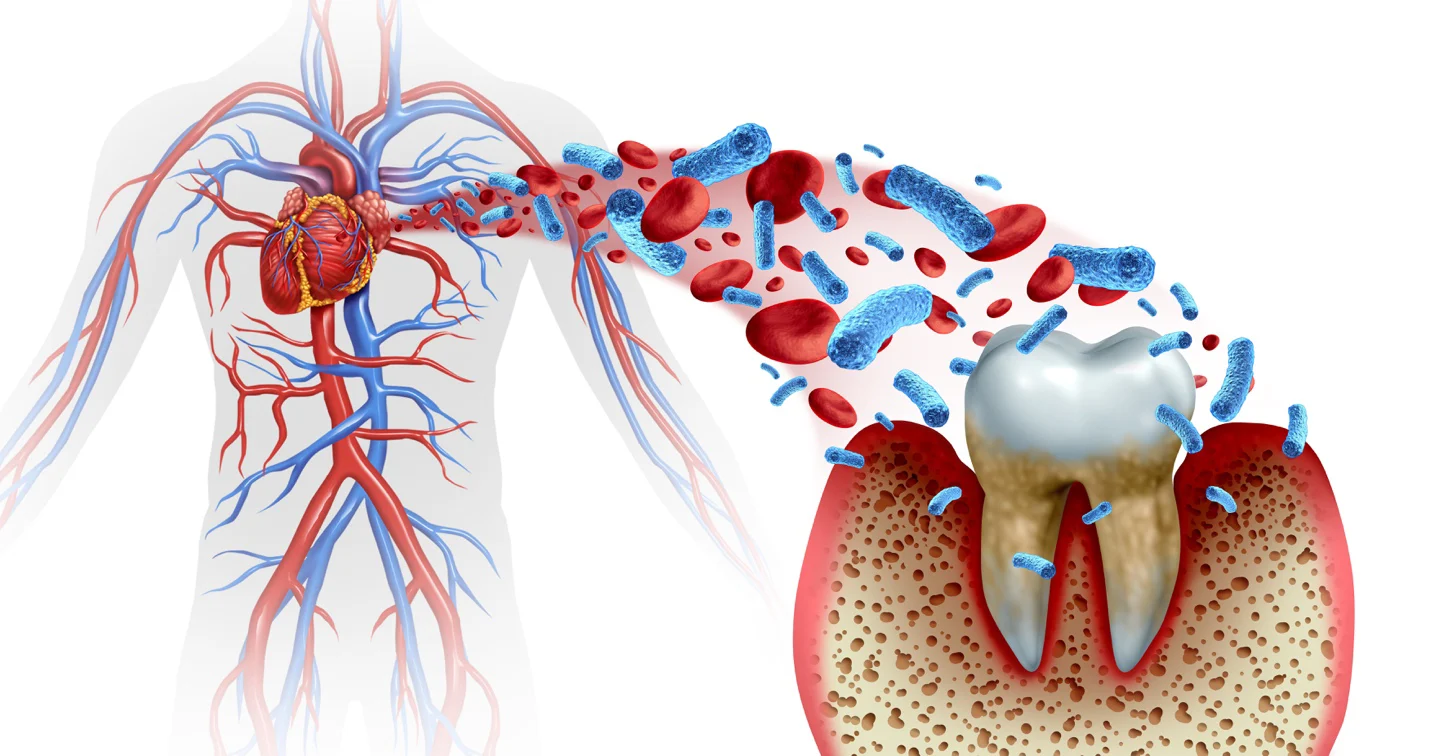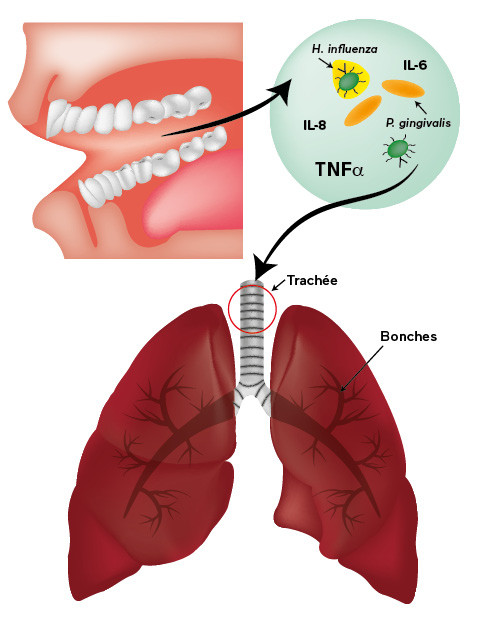In our quest for well-being, the importance of oral health is often underestimated, even though it plays a crucial role in our overall health. At Dental Geneva, we know that the health of the mouth is a mirror of our general health condition. In this article, I will explain why impeccable oral hygiene is not limited to an attractive smile but is a fundamental pillar of our well-being.
Table of Contents
- Oral health and cardiovascular diseases
- Oral health and osteoarticular pathologies
- Oral health and type 2 diabetes
- Oral health and respiratory pathologies
- Oral health and pregnancy
- Smoking and oral health
- Diseases linked to poor oral health
- Towards optimal overall health: the commitment of Dental Geneva
Oral health and cardiovascular diseases
Periodontal inflammation is recognized as a significant risk factor for heart diseases, supported by comprehensive epidemiological studies that demonstrate a clear link between periodontal diseases and an increased risk of cardiovascular conditions, such as atherosclerosis and strokes. The main hypothesis is that the inflammation and bacteria responsible for periodontal conditions can contribute to the accumulation of plaque in the arteries and worsen inflammation throughout the cardiovascular system.
A recent study from EPFL, published in eLife, reveals that infection with Fusobacterium nucleatum, a bacterium linked to periodontal diseases, can increase the risk of cardiovascular disease. This finding highlights the importance of infections and inflammation in the development of heart diseases and paves the way for preventive approaches, such as screening and treatment of periodontal infections, to reduce cardiovascular risk.
These findings reinforce the importance of increased vigilance and meticulous care of our oral health, emphasizing its pivotal role in maintaining overall health, including that of our heart.

Oral health and musculoskeletal disorders
Periodontitis, severe inflammation of the tissues around the teeth, has been identified as a potentially aggravating factor for individuals suffering from rheumatoid arthritis. This connection is based on the common inflammatory nature of both diseases, where chronic inflammation and exacerbated immune responses play a central role.
Studies have shown that bacteria responsible for periodontitis, such as Porphyromonas gingivalis, can not only trigger an inflammatory response in the mouth but also adversely affect the joint inflammation characteristic of rheumatoid arthritis.
Rigorous oral hygiene and regular periodontal care can improve periodontal health and contribute to reducing the symptoms and severity of rheumatoid arthritis.
Oral health and type 2 diabetes
The link between oral health and type 2 diabetes is deeply interconnected. Indeed, individuals with type 2 diabetes are particularly prone to developing periodontal diseases, an inflammatory condition affecting the gums and bone around the teeth. Diabetes alters the body’s ability to use blood sugar, which can lead to increased levels of glucose in the saliva, thus creating an environment conducive to oral infection and inflammation.
Conversely, periodontal diseases can exacerbate diabetes. The inflammation caused by gum diseases can increase insulin resistance and, consequently, worsen glycemic control in diabetic individuals.
At Dental Geneva, we understand the significance of this relationship and encourage our diabetic patients to adopt a strict oral hygiene routine: regular visits to the dentist, brushing, and daily flossing.
Oral health and respiratory pathologies
The mouth can act as a reservoir for pathogenic bacteria which, when inhaled, can worsen or trigger infections in the respiratory tract, especially in individuals already vulnerable due to pre-existing conditions.
Periodontal diseases, characterized by inflammation and infection of the gums, play a significant role in this interaction. The bacteria responsible for these conditions can be aspirated into the lungs, contributing to illnesses such as pneumonia, bronchitis, and potentially exacerbating chronic diseases like chronic obstructive pulmonary disease (COPD). This is particularly concerning for the elderly, smokers, and those with weakened immune systems, for whom respiratory diseases pose an increased risk of severe complications.

Oral health and pregnancy
Studies have shown that periodontal disorders can negatively affect the course of pregnancy, increasing the risks of premature births, low birth weight babies, and pre-eclampsia.
Pregnancy comes with hormonal changes that may affect the gums’ response to dental plaque, leading to increased sensitivity, bleeding, and, in some cases, pregnancy gingivitis. If untreated, this inflammation can progress to more severe periodontitis, endangering the health of both mother and fetus.
Research also suggests that bacteria from periodontal infections can enter the bloodstream, reach the uterus, and stimulate the production of chemicals like prostaglandins, suspected of triggering premature labor.
We consistently provide advice and care needed to navigate this delicate period with confidence, ensuring the oral health of our pregnant patients and, by extension, that of their future child.
Smoking and oral health
Smoking affects not only the aesthetic of the smile due to tooth discoloration but also significantly increases the risk of periodontal diseases, tooth loss, and even oral cancers.
Tobacco interferes with the function of gingival cells, compromising the mouth’s ability to heal and defend against infections. This, combined with reduced blood flow, creates an ideal environment for plaque accumulation and the development of gingival inflammation. Smokers are therefore much more likely to develop periodontal diseases than non-smokers, often in more severe and treatment-resistant forms.
Moreover, the toxic chemicals present in tobacco smoke can cause mutations in the cells of the oral mucosa, potentially leading to precancerous or cancerous lesions.
At Dental Geneva, we strongly encourage our patients to quit smoking. Regular check-ups not only help monitor and maintain oral health but also allow for the early detection of any signs of periodontal disease or oral cancer.
Diseases linked to poor oral health
Neglecting oral hygiene is linked to a wide range of diseases, from neurodegenerative disorders like Alzheimer’s disease to serious conditions such as cancers of the upper aerodigestive tract.
The chronic presence of infections and inflammations in the mouth, such as those caused by periodontal diseases, can play a role in the development and progression of Alzheimer’s disease. Research has shown that periodontal bacteria can migrate from the periodontium to the brain, contributing to the formation of amyloid plaques, a hallmark of Alzheimer’s disease. This underscores the critical importance of good oral health in the prevention of neurodegenerative disorders.

Moreover, oral health is closely linked to the risk of developing cancers in the upper aerodigestive tract. Chronic inflammation and exposure to carcinogens in the mouth can increase the risk of these types of cancers.
The illustration above highlights the deep interconnection between oral health and the major non-communicable diseases, emphasizing the modifiable risk factors we share. This idea underlines the importance of taking care of our health as a whole, showing that healthy habits and good dental hygiene are essential to avoid many serious diseases.
Towards optimal overall health: the commitment of Dental Geneva
Our oral health is about much more than aesthetics; it’s crucial for our general well-being. If you have any doubts about your oral health or want to learn more about how to reduce these risks, don’t hesitate to quickly make an appointment with Dental Geneva. We are dedicated to guiding you toward optimal oral health, which in turn, contributes to protecting your overall health.


